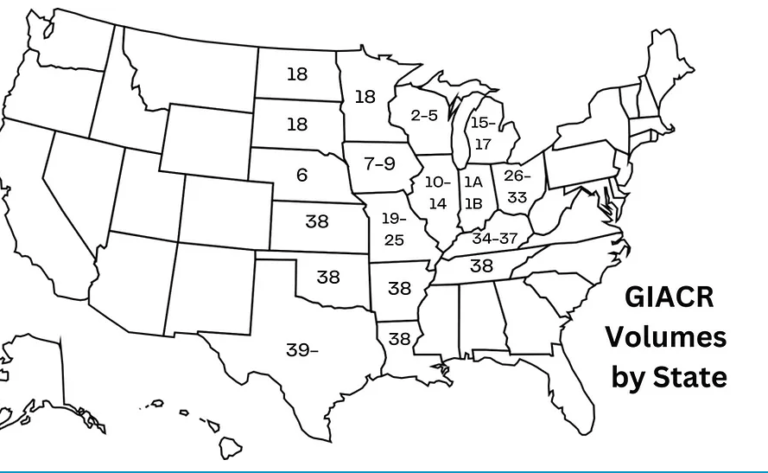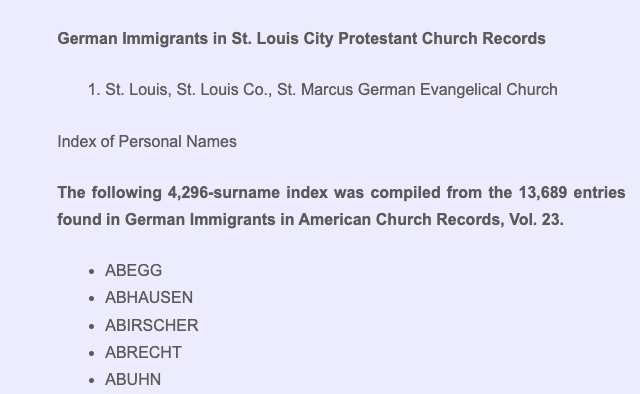As records are kept at the local level in Germany, you’ll need to find your German ancestor’s hometown before you can begin your research in Europe. However, many US sources often only list the German state a person came from, citing “Prussia” or “Baden” as their place of origin. As these German states are vast, this information will likely not help you find your ancestor’s record – you need to narrow it down to the actual town itself. So how can you do this?
While there are multiple sources that may help (see Before You Cross the Pond: Five Places to Find Your Ancestor in America for some more ideas), this article will discuss the number one source for finding that hometown in US records – and the books you can use to help!
What is the number one source for finding my ancestor’s hometown?
According to Dr. Roger Minert, the number one source to look for a German hometown in the US is local Protestant church records. And lucky for us, he has been working on a book series that makes finding this information much easier. German Immigrants in American Church Records, books which collect data from American (Protestant) church records and publish this data in one place, is an ongoing process, and a definite source you will want to check out if you have not yet identified your immigrant ancestor’s hometown.
What is the project exactly? Since 2003, Dr. Minert has been supervising teams of students, working on extracting church record data on German immigrants from US churches. These books include abstracts of original church records with source citations, allowing you to identify that hometown and more.
There are currently 38 books published, with each volume focusing on different areas across the country. The 39th book (Texas) is currently in process. If your ancestors are from Austria, Switzerland, Luxembourg, or Liechtenstein, they may also be included in these books.
I already know my ancestor’s hometown – can these books still help me?
Even if you do know your ancestor’s hometown, you may find even more life details about your ancestor in these books. A typical GIACR marriage entry, for example, could include the person’s name, hometown, date of birth, date of marriage, and spouse. Parents and other information may be included as well. Baptismal entries, confirmation entries, and death entries are also included in these volumes.
Fun fact: One of our own Germanology Unlocked translators, Charlotte Champenois, is an Associate Records Analyst for the German Immigrants in American Church Records (GIACR) project, where she extracts information from church records written in the old German script and determines the standard spellings of listed German birth towns. Go Charlotte!

How do I find the right book?
My German ancestors settled in St. Louis, Missouri (see From Germany to America: My Own Family Story) in the late 1880s. I could then go to the list of books published and find the books on Missouri. Once I see those (Volumes 19-25), I discover that six of those seven books are on St. Louis alone! How do I find out which one to look for?
Luckily, I can click “Find Out More” above the book’s title (not below, don’t make the same mistake I did!). When I scroll down, I can see the churches that particular volume includes, as well as a list of surnames. Full name indexes are also available in Roger Minert’s “Collected Works”, which can be purchased for digital download or as a USB from his website here.

Where can I get these books?
These books are available for purchase at Family Roots Publishing. As they do cost over $100, I would suggest making sure you are looking at the correct book before purchasing! If you do not want to purchase, they are also available at the Family History Library and various other libraries with genealogy departments.
For strategies on how to use these books, check out this video by Dr. Minert himself!
Have you used these books before? What do you think? Let us know in the comments!
If you would like to donate to this project, which is a non-profit, click here and scroll down to the bottom. They are very grateful for any support!

2 Responses
Sigh! My German immigrant ancestor fought with the Hessians in the Revolution, then settled in Kent, MARYLAND. Argh. From the map, I don’t see Maryland churches getting analyzed anytime soon
My immigrant Geis(s)Inger ancestor was a Mennonite and settled in Pennsylvamia around 1725. Looks like I am out of luck.